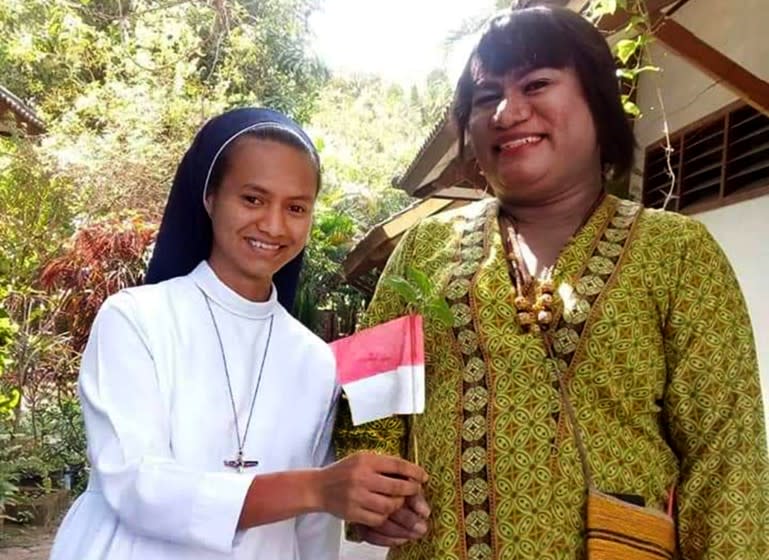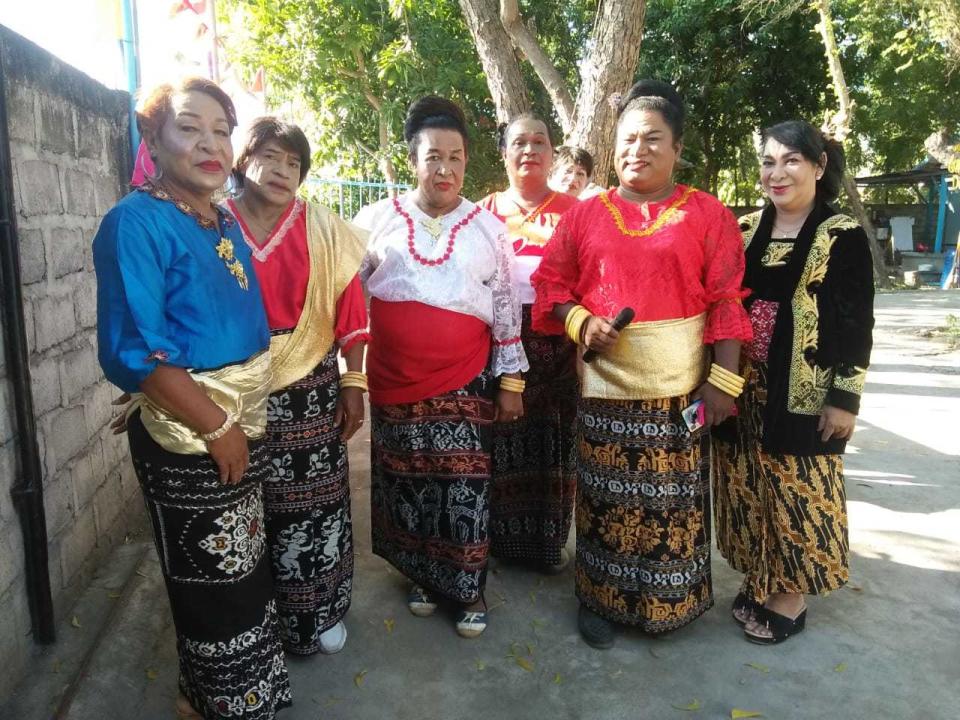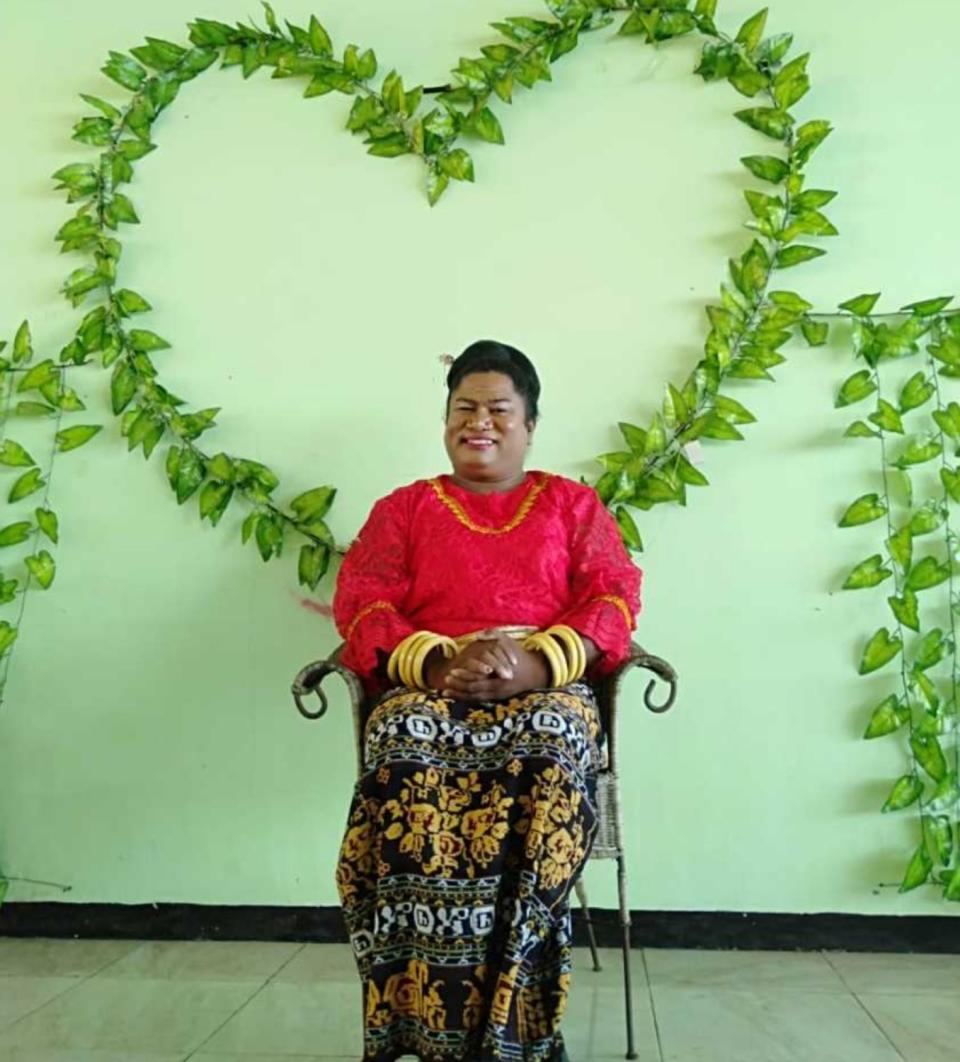Against rising intolerance, a transgender Indonesian woman finds acceptance in a remote village

Hendrika Mayora Victoria Kelan, who once secretly sewed a dress out of mosquito netting, was met with stares and whispers when she returned to her childhood village of Habi on the southern reaches of Indonesia.
Many in the earthquake-prone farming community carved into a patchwork of cornfields along the Flores Sea recoiled at the thought of a transgender woman living in their midst. She knew them, their names and households. Yet more than a few believed a deviant spirit resided inside her.
Decades of struggle had inured Kelan to scorn: the taunts of children who mocked her femininity as a boy, the agonizing decision to leave the Catholic clergy after coming to terms with her gender identity, and the daily threats of violence she faced after she succumbed to sex work to earn a living.
Drawn back home to mourn the death of a cousin, Kelan wanted to start anew, refusing to accept the fate of so many transgender Indonesians condemned to life on the margins. She came out to her family. She stopped wearing the loose T-shirts and trousers she wore to mask her transition. She put on lipstick, draped herself in beads.
A priest welcomed her to volunteer at a nearby parish, helping with Sunday school and leading a choir. During village ceremonies, Kelan would help prepare food alongside the other women. Villagers began to embrace her, calling her Bunda Mayora, or Mother Mayora. They even urged her to run for head of Habi’s village governing body.
In March, she did the improbable, winning the election by beating seasoned candidates and civil servants who dismissed her as a novelty. As the months have passed, Kelan, 34, has been hailed as the only known transgender Indonesian to ever hold public office, providing a glimmer of acceptance in a country where LGBTQ people face mounting discrimination.
“As a trans woman, we are so often despised,” Kelan said in a phone interview. “I saw the hardships of others like me and I was determined to make a change.”
While homosexuality isn’t illegal in Indonesia — apart from the western province of Aceh, which is governed under Sharia law — LGBTQ citizens face increasing prejudice in the world’s largest Muslim-majority country. The rise of a conservative brand of Islam has amassed more power in Indonesian politics and society by fueling anti-LGBTQ sentiment. Conditions are rarely better in minority Christian or Hindu enclaves.
Indonesia ranks as one of the least tolerant countries for LGBTQ rights, according to a study by the Williams Institute at UCLA School of Law, which placed the Southeast Asian nation 150th out of 174 countries for social acceptance.
Only 9% of Indonesians say homosexuality should be accepted by society compared with 72% in the U.S., according to a Pew Research poll published in June.
In 2016, the Indonesian Psychiatric Assn. classified homosexuality a mental disorder. Even today, LGBTQ Indonesians are subjected to forced exorcisms akin to ritualistic conversion therapy. Private parties, homes and businesses harboring LGBTQ events are commonly raided by police or crashed by religious conservative groups. Lawmakers have tried to criminalize same-sex behavior, including with a recent bid to change the nation’s criminal code to prohibit consensual sex between unmarried people.
The intolerant environment has created special hardships for transgender Indonesians, known in the country as waria, which comes from the Indonesian words wanita, meaning woman, and pria, meaning man.
Treated as pariahs today, waria face limited career prospects. Employment with the government, considered one of the few stable paths to the middle class, is next to impossible. Many are disowned by their families, suffer from loneliness and depression and have few options other than to work on the streets, often as buskers singing to outdoor diners.
In April, a group of men killed a 43-year-old transgender woman in Jakarta by dousing her with gasoline and setting her on fire after accusing her of stealing a phone and wallet.
The case follows numerous other instances of violence, including beatings and murders of transgender sex workers.
“The condition for trans people in Indonesia is deteriorating,” said Kanzha Vinaa, head of Sanggar Swara, a Jakarta-based support group for transgender Indonesians. “Hate speech and violence is escalating. Conservative political groups know they can use their opposition to LGBT people to attract votes.”

Residents of Habi said they overcame their prejudices when they saw how committed Kelan was to the community, earning her the election victory.
“She is a decent woman. She is open to everyone,” said Yuni Bara, 23, who attends the same church Kelan volunteers at in the predominantly Catholic community. The more he spoke to Kelan, the more he came to appreciate the complexity of gender identity and understand the mistreatment of transgender Indonesians.
“They are not just pretending to be women,” Bara said. “It turned out the stigma for waria was wrong. She made me wonder how a trans woman can accomplish so much. How can she be so active in the parish and still have some people not accept her?”
Kelan was born in Habi, but moved with her family to the province of Papua when she was still an infant. As a child, she was relentlessly teased for not being masculine enough. She tried to obscure her femininity, with little success, by taking up karate and taekwondo.
By the time she was a teenager, she would secretly apply make-up when she was alone. She felt she was coming into who she was, and relished the few times when no one was around when she could try on her dress of mosquito netting.
“I was ashamed," she said, "but I had no doubt of my femininity.”
But many Indonesians were not ready for such transformation. Searching for answerers, Kelan turned deeper into her faith. Growing up attending mass almost every day, she felt compelled to enroll in a seminary after junior high school and later took an oath as a Catholic brother.
Living in a monastery in Yogyakarta, a city known as the cradle of Javanese culture, Kelan increasingly struggled to reconcile her personal struggle with church teachings. She developed vertigo from the stress and eventually quit the clergy in 2015 after initially being denied by the local archbishop.
“I thought God was unfair,” she said. “I felt like I had sinned by not being like other men. I even protested to God: Why create me in the body of a man if I feel like a woman?”
Kelan started working at a nonprofit agency helping people with HIV and made extra cash as a tutor. She then met a trans activist who urged Kelan to shave her beard and embrace her identity by wearing women’s clothes and make-up. She shed her male name.
The transition was liberating, but it left her nearly destitute and unable to find steady work. She started busking with other trans women. When that wasn’t enough, she worked alongside transgender sex workers on the streets. She sometimes used her martial arts skills to break up fights and protect fellow prostitutes. She still has a pin in her arm from an injury sustained fleeing police.
It wasn’t until she reconnected with LGBTQ activists that she was able to pull herself off the streets. Kelan began advocating for transgender rights at seminars and college campuses.
When she returned to Habi in 2018, she carried the double stigma of quitting the clergy and being transgender. Villagers assumed she left because she was caught violating her vow of celibacy.

“People were curious about my decision to leave" the brotherhood, Kelan said. “And they were curious about my identity as waria. But I did not care. I kept trying to do positive things to let the stigma fade away. I wanted to prove waria are not dumb or nasty. Slowly, I changed the way neighbors saw me.”
Six-months into her six-year term as head of the so-called village consultative body, Kelan has used her time to distribute food and seeds to villagers whose meager incomes have been battered Indonesia’s runaway COVID-19 outbreak and the region's natural disasters.
Habi is located on the island of Flores in East Nusa Tenggara province, a volatile area that has been ravaged by earthquakes, tsunamis, volcanic eruptions and tornadoes. Last month, a twister toppled homes in the village.
Kelan, who oversees the budget for Habi’s 2,000 inhabitants, has also used her platform to encourage other transgender Indonesians to do volunteer work to raise acceptance. On Aug. 17, she led nearly two dozen other trans women in a flag ceremony for Indonesia’s Independence Day calling for equal rights.
“Her story is inspiring,” Vinaa of Sanggar Swara said. “By being elected, people can judge her by the job she does. She can gain people’s trust and prove trans women are capable of anything.”
Times staff writer Pierson reported from Singapore and special correspondent Hutabarat from Jakarta.
This story originally appeared in Los Angeles Times.

